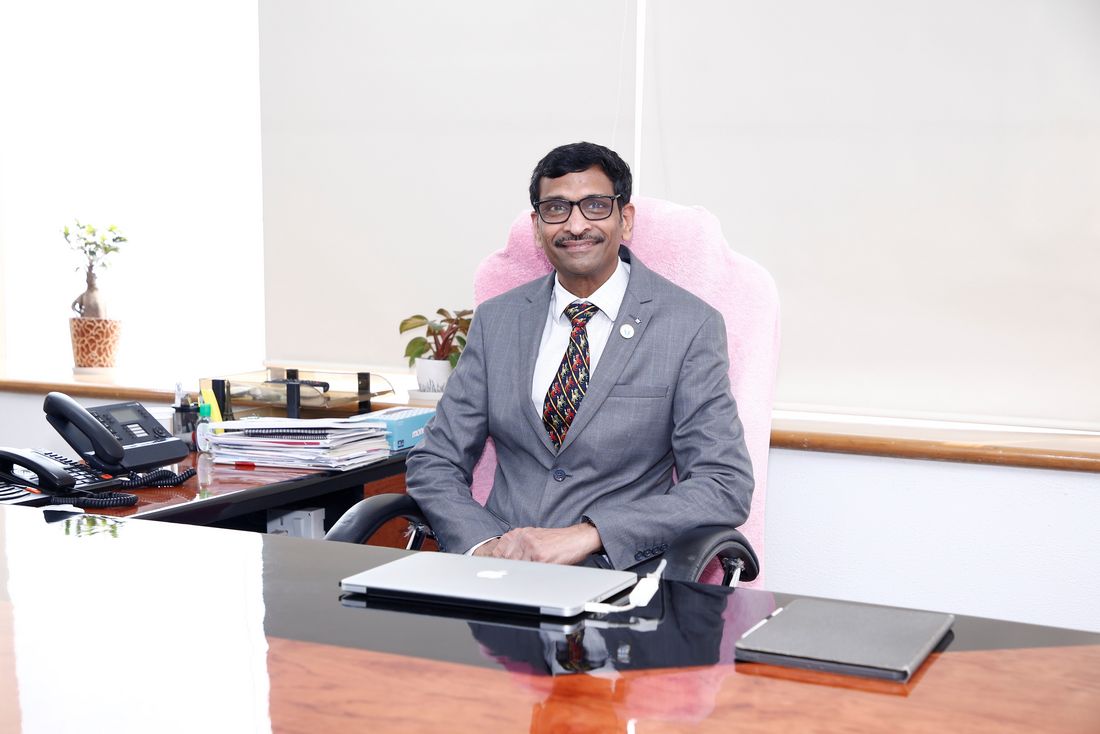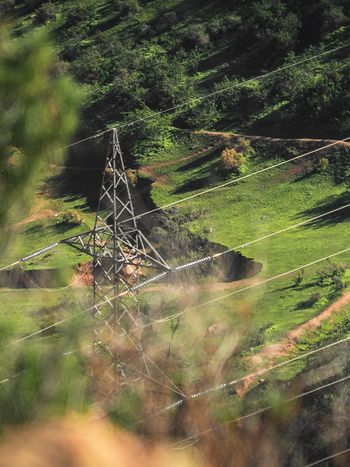An interview with KVS Baba, founder CMD of POSOCO
“An interview with …” is a series of articles in which senior executives give their view of the developments in the energy sector.
This article highlights the key aspects of an interview conducted by Vinay Sewdien with KVS Baba, founder CMD of POSOCO.

Who is KVS Baba?
I am the Founder, Chairman, and Managing Director (CMD) of Power System Operation Corporation Ltd. (POSOCO), India’s national power system operator, and responsible for the reliable and economic operation of the All India electricity grid, which is also connected to the neighbouring countries. During my work life of 37 years, I was associated with power system planning, design, and operation. During this period, the Indian grid connected to neighbouring countries i.e. Bangladesh, Bhutan, and Nepal through HVDC and HVAC transmission systems. I co-ordinated several electricity market reforms such as the Frequency Control Ancillary Services, Security Constrained Economic Despatch (SCED), Green Day Ahead Market, Green Term Ahead Market, etc. I took keen interest in the implementation of secondary control in India through an automatic generation control (AGC) project spanning over 50 GW generation capacity and going up to 80 GW by next year.
I was the Chairman of Indian National Study Committee and CIGRE Study Committee C2 (on System operation & Control). I have been collaborated with GO15 (formerly Very Large Power Grid Operators of the World), Global Power System Transformation Consortium, International Hydropower Association Forum on Pumped Storage.
What work do you currently do? How does your typical workday look like?
In my role as CMD of POSOCO, my daily activities cover two main aspects. The first aspect of my activities focusses around decision making sessions, interaction with policy makers, planners, regulators, and analysis of several scenarios and risks that can endanger reliability and security of our India Power System. We have numerous interactions with various national and international stakeholders on the present and future developments in the Power Sector. The second is to connect with my colleagues at all levels of the company. I find it vital to interact with the colleagues on various issues, both professional and personal, who are engaged in various capacities across various departments like System Operations, SCADA, and Market Operations, etc.
How is POSOCO involved in CIGRE? How has POSOCO benefited from the participation in CIGRE?
CIGRE and POSOCO have a long cherished cooperation for many decades cutting across various facets of the Indian Power System. CIGRE played an important role in the development of insights and tools for the analysis of challenges faced in the Indian Power system and measures to mitigate those challenges. CIGRE’s Working Groups have proven to be a valuable place for tacking the various issues related to power system operations. CIGRE’s fact-based approach is completely unbiased, vendor neutral, and open to inclusive, frank discussion and debate about any issues, trends and challenges facing the power industry. CIGRE documents, especially the Technical Brochures, have given key insights of various subjects and have also paved the way for evolution of effective System Operation and emergence of POSOCO as an Independent Institution in India. POSOCO representatives have been contributing to key study committees and working groups with ever increasing participation in the CIGRE activities.
What polices is India pursuing to battle climate change? How is POSOCO supporting these policies?
The Government of India has the commitment to ramp up India's fight against climate change and to ensure Energy Transition in all potential sectors of the economy. At the COP26 climate summit in Glasgow in November 2021, Hon’ble Prime Minister announced India’s ‘Panchamrit’ to combat climate change effects:
- India will reach its non-fossil energy capacity to 500 GW by 2030.
- India will meet 50 percent of its energy requirements from renewable energy by 2030.
- India will reduce the total projected carbon emissions by one billion tonnes from now onwards until 2030.
- By 2030, India will reduce the carbon intensity of its economy by less than 45 percent.
- By the year 2070, India will achieve the target of Net Zero.
The challenges in grid operations have increased manifold, starting with the increase in system size over the years, as well as the addition of many factors; the interconnection of regional grids in India, cross border interconnections to form a very large synchronous grid, evolving consumer load profiles, changing network characteristics due to increased deployment of FACTS/HVDC elements, rapid growth in RES in the grid along with thrust on sectoral coupling through electrification, and the occurrence of extreme natural events. Apart from these aspects, increasing appetite for cost optimization to achieve economy by the Load Serving entities, fast developing electricity market structure, pose entirely different arenas to the system operators. The challenges are being met by POSOCO in improving stakeholder coordination, system visualization, data analytics, system simulation studies, system automation, flexibility, resilience, deployment of optimization techniques, and operator training.
POSOCO is supporting the Indian grid operations with strict compliance to technical standards by all Grid Users, improving demand/RE forecasting, resource adequacy, maintaining flexible reserves, strengthening of wideband communications, strengthening of intrastate transmission and distribution network, and empowerment of institutions of State Load Dispatch Centres.
What are the biggest challenges that POSOCO is facing, now and in the future?
In the future, electrical grids will experience many challenges, including a changing composition of generation resources with an increase in renewable and distributed generation, an aging AC transmission infrastructure, and increasing demand for electricity. These challenges are already stressing the existing infrastructure and result in operation closer to grid stability limits. The future of power systems will have more integration of energy sources for cleaner environment. The application of HVDC and FACTS will provide performance solutions for network control.
There is a need for India, being similar to the European model in several aspects, to adopt (under concurrent responsibility at state and national level) resource adequacy at all time horizons. There is need for all kinds of reserves – primary, secondary and tertiary – to be made available at both intra-state and inter-state levels with mandate through Grid Code. Operational challenges include fast ramping, variability, intermittency, potential grid instabilities resulting from loss of inertia, loss of visibility and controllability of the behind-the-meter resources, load stagnation/oversupply, inadequate communication interfaces and operator training. Flexible operation of the existing conventional generation is being increasingly called for. The deepening of markets through introduction of new products and increase in the number of players would affect the scale and complexity of grid operation. Therefore the Grid Code, which was last revamped in the year 2010, must address these changes and challenges and facilitate various aspects.
The challenge of market transformation to harness flexibility needs to be addressed. The market-based procurement of ancillary services, especially from renewable resources, will be needed. Introduction of fast markets in terms of 05-minute scheduling and settlement systems has already been tested in pilot mode and, hence, will need appropriate regulatory framework. New market instruments for adequacy, balancing and demand response along with financial instruments to hedge against risks requires greater coordination for physical and financial markets. Cross border players participation in Indian electricity market is already on rising trend and hence, suitable measures would be needed for regional market cooperation.
What skills in the work force are required to meet the previous mentioned challenges?
In the coming years, POSOCO system operators need to enhance and upgrade their skills focused on system security, reliability, resilience through resource adequacy, network modeling and simulation studies, forecasting, assessment and deployment of reserves and optimization. POSOCO works towards enhancing transparency, stakeholder coordination and collaboration with the academia. POSOCO internal policies focus on talent management, empowering our system operators and keeping them motivated to meet the growing stakeholder expectations.
The mindset and skill set has to take into account the integration of new players such as electric vehicles, storage, green hydrogen, Distribution System Operators (DSOs). The skills in the digital infrastructure, cyber security and way of work scalable with interoperable information and communication systems has to be emphasized in the ‘new normal’. Modernization of control centres with artificial intelligence tools and system performance maximization are two of the key areas to ensure efficient system operations.
Finally, how can young professionals and seasoned experts benefit from participation in CIGRE? What is POSOCO doing to increase this participation?
CIGRE is an excellent platform for professional growth, especially for young people. The association with CIGRE’s highly valued technical community would enable the young professionals and seasoned experts with advancements in the scientific credentials, technical know-how and policy foresight in the areas related to power systems. The future focused industry perspective of CIGRE is very valuable for knowledge-centric organizations like POSOCO. The real-world experiences along with lessons from trials and errors is complementary to the academic research, especially for young professionals.
POSOCO, as a CIGRE collective member for over a decade, has played a prominent role in ensuring India’s contribution to the CIGRE knowledge column. POSOCO has access to thousands of technical documents from CIGRE’s e-library that are utilized as authoritative resource for referencing on important matters related to grid operations. POSOCO representatives attend the CIGRE Session and the SC meetings regularly and actively contribute to several Working Groups.

